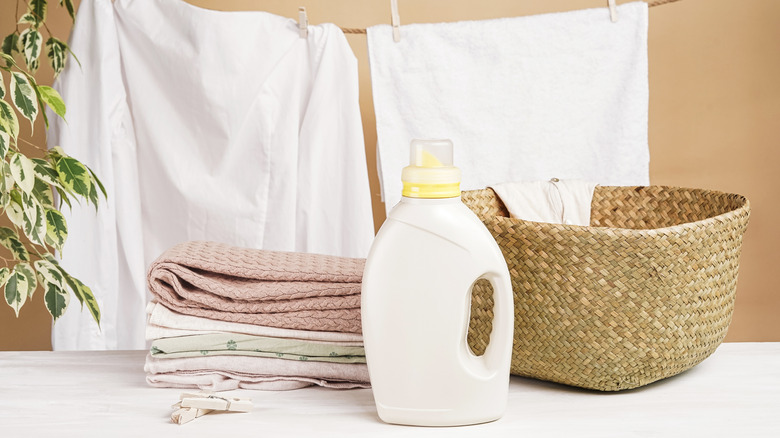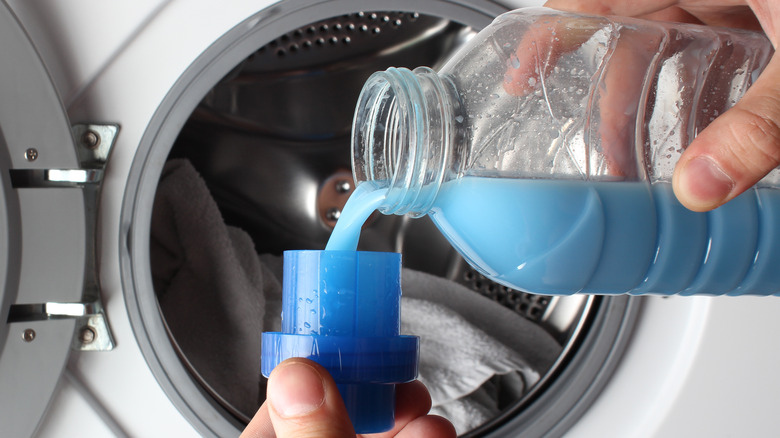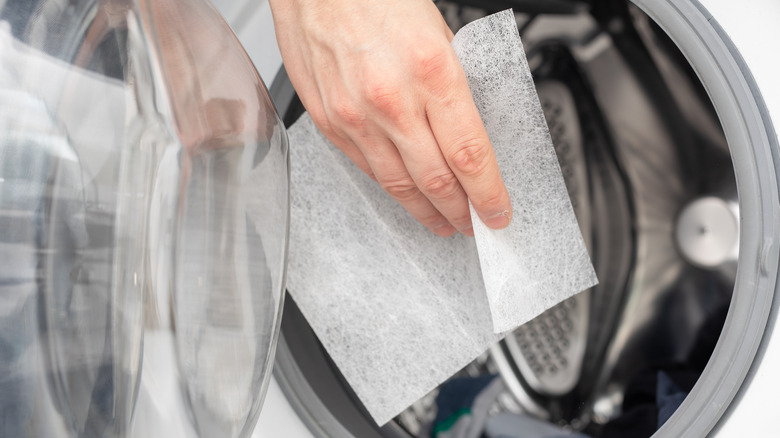Why You Should Stop Using Fabric Softeners Immediately
Fabric softener: Some can't do a load of laundry without it, while others avoid it like the plague. For those who must use it with every load, the benefits probably outweigh the negatives. Fabric softeners, whether in liquid or dryer sheet form, have three key benefits. They soften clothes, reduce static, and usually leave fabrics with a fresh scent.
But many find that they can't use softeners for the possible negative side effects. For those with sensitive skin, the added fragrance could cause an allergic reaction. Others may not want to expose themselves to the potentially harmful chemicals in many fabric softeners. These chemicals might be detrimental to both your health and also the environment, per Scientific American.
If you're someone who avoids fabric softener but still wants the great benefits, keep reading for some more natural and sustainable options that will leave your laundry soft, fresh, and static-free.
Liquid softener alternatives
If you'd prefer to soften your laundry from the washing machine, there are a few alternative ingredients you can use.
The first is baking soda. A regular staple of most kitchens, this ingredient removes odors and softens fabrics. Because only half a cup is needed, per The Homemade Experiment, this is a cheap alternative to regular softener. A con, however, is that this ingredient has to be added to the rinse cycle, not the beginning of the wash. Having to wait to add this may be annoying for some.
The second alternative is vinegar. Another regular household item, vinegar is used for many cleaning purposes, including removing bad smells from the washing machine itself. Like baking soda, vinegar softens fabrics and removes odors. It's also inexpensive, making it available for many. However, some may not enjoy the initial strong smell. Thankfully, the smell isn't known to cling to clothes. But if you want to add a fresh scent, try mixing essential oils into the vinegar before adding it to your laundry dispenser tray.
Finally, a mixture of hair conditioner, water, and vinegar is a great alternative, per One Good Thing By Jillee. The recipe calls for six cups of water, three cups of white vinegar, and two cups of conditioner. This mixture is great because the ingredients are cheap and easy to find. Another benefit is that the scent is completely customizable. However, some may be turned away by the unnatural ingredients found in some hair conditioners.
Dryer sheet alternatives
If you would rather have your clothes softened in the dryer, there are a few more options. Some prefer these alternatives because they involve fewer chemicals and no scent.
The first is a wool dryer ball. Because one dryer ball can be used for multiple laundry loads, this option is much more sustainable than a dryer sheet, per The Spruce, and may also save you money over time. These wool balls soften clothes and reduce static. They may also reduce your clothes' drying time. The only con? Because they bounce around the dryer, they may be noisy.
The second option is a tennis ball. Similar to the wool dryer ball, tennis balls reduce static and soften clothes. They can last for several washes, but not as long as a wool dryer ball. And they can reduce your drying cycle time. However, they can also be loud; they could even cause damage to your dryer. And they're more expensive than other alternatives. Still, this could be a good option for someone in a pinch (who also loves tennis!)
The third option is an aluminum foil ball. Because aluminum foil is found in most households and at most stores, it's easily accessible. It's pretty inexpensive as well. To use this method, take a small sheet of aluminum foil and crunch it into a smooth ball. Your DIY dryer ball will reduce static and smooth your clothes. However, just like the other options, it may be noisy.


